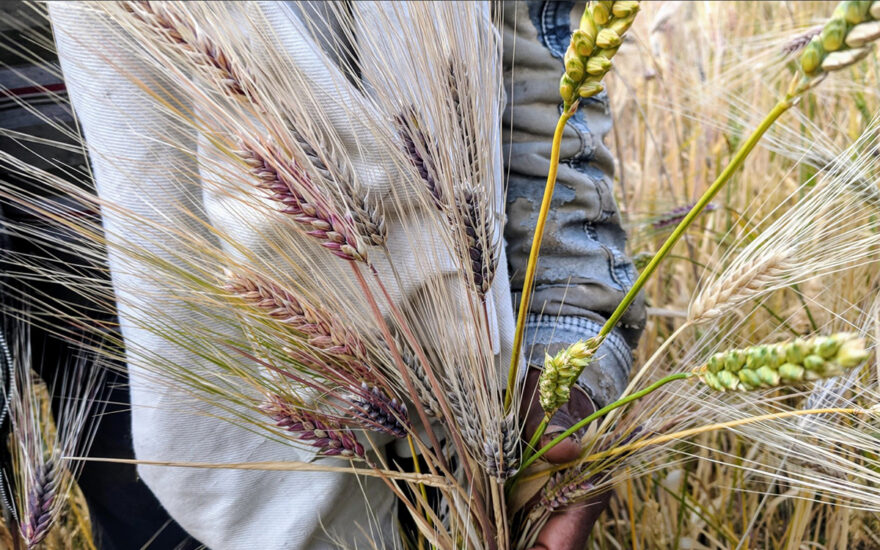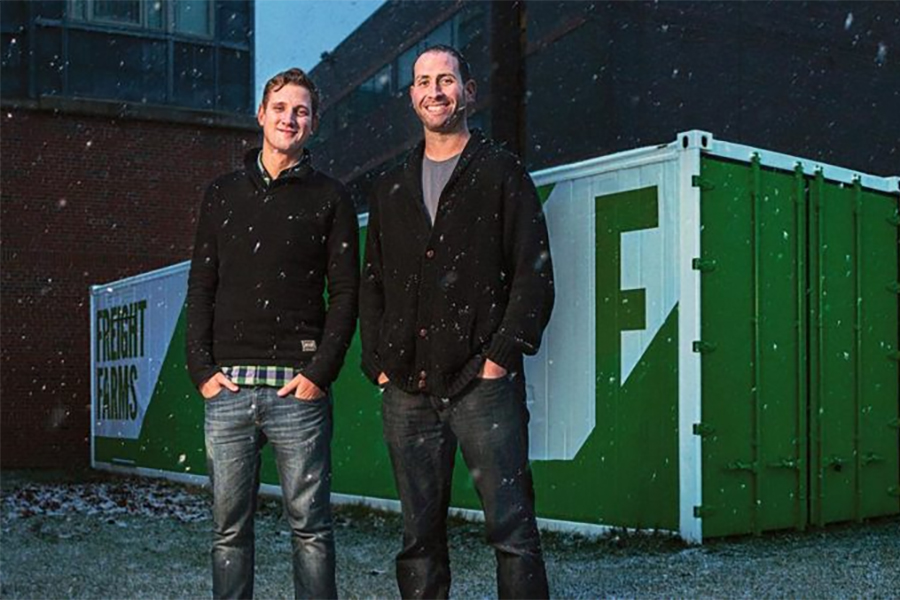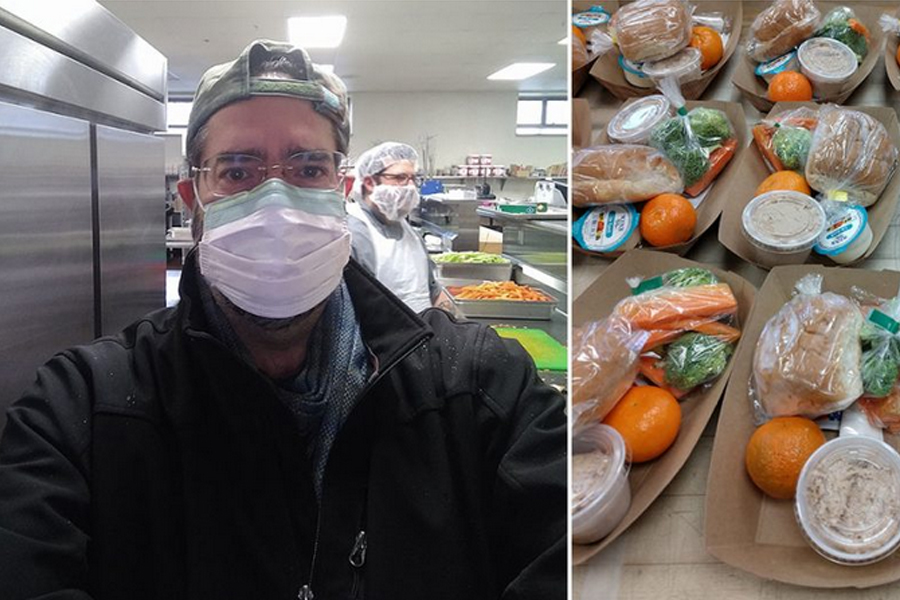Food Security, Sustainability, and Justice
The Master of Science in Sustainable Food Systems prepares students to tackle the social and ecological complexities that create food insecurity.

Food is a human right
Food is a fundamental human right and central to sustainable, equitable, and just community development. Food is more than nutrients – it is an ecological relationship and an expression of cultural values.
Are you ready to engage the complex social and ecological dynamics of local food systems? Are you looking for ways to contribute to innovative initiatives and social movements for food security, sovereignty, and justice?
Clark’s Master of Science in Sustainable Food Systems will help you build the knowledge, skills, and experience you need to connect your career and your values. Our graduates work across the globe – in the public, nonprofit, and private sectors – to enhance sustainability and justice within food systems.
By taking foundational courses in social and environmental science and developing expertise in project management and monitoring and evaluation, students are prepared to transform institutions and systems to produce equitable and sustainable outcomes. Our dynamic studio courses and Global Learning Collaboratives provide hands-on experiences and know-how to take action.

Complex challenges require authentic community engagement
Environmentally and socially just food systems require diverse forms of knowledge and abilities. Students learn from practitioners, policy-makers, and community members to work across intellectual, professional, and individual differences toward shared visions of sustainable and equitable food systems.
STEM Designated Program. If you are an international student with a Master’s in Sustainable Food Systems, you may be eligible to work in the US for up to 36 months on Optional Practical Training (OPT).
Critical Knowledge, Skills, and Experience:
The Sustainable Food Systems Curriculum
| Curricular Feature | 10-unit | 12-unit practice | 12-unit research |
|---|---|---|---|
| Required Core Courses: Degree Specific | 2 | 2 | 2 |
| Sustainability Studies | 1 | 1 | 1 |
| Social Change and Institutional Transformation | 1 | 1 | 1 |
| Fundamental Skills: Project Management Monitoring & Evaluation Organizational Leadership Spatial Analysis | 2 | 3 | 1 |
| Methods of Inquiry & Subject Matter Electives | 1.5 – 2 | 1.5 – 2 | 2.5 – 3 |
| Intersectional Analysis | 0.5 – 1 | 0.5 – 1 | 0.5 – 1 |
| Principles and Ethics in Community Engagement (Common Seminar) | 0.5 | 0.5 | 0.5 |
| Experiential Learning: Studio courses Summer Global Learning Collaboratives Internships | 1 | 2 | 1 |
| Directed Study | 0 | 0 | 1 |
| Thesis writing | 0 | 0 | 1 |
Choice of three program tracks
10-unit track completed in three semesters (Fall or Spring start)
12-unit research track completed in four semesters, with students conducting primary research in the summer between their two years of study (Fall start only)
12-unit practice track completed in four semesters, with students engaging in two experiential learning opportunities.
Career Outcomes

Gain access to vast network of Clark alumni working to advance sustainability and justice in our food systems.
Clark graduates hold a wide range of jobs across a range of organizations in the food security and justice arenas. Just a small list of examples displayed on the right.
- Senior Food Security Analyst, Famine Early Warning Systems Network
- Government Partnerships Officer, World Food Programme Berlin
- Farm Manager and Food Justice Activist, Soul Fire Farm
More
- Founder and Steward, WILDSEED Community Farm & Healing Village
- Director of Food and Climate Systems, Massachusetts Institute of Technology
- Associate Professor, Environmental Science and Forestry, SUNY Syracuse
- Leadership Team Member, Maine Medical Center Food Pantry
- Food Access Manager, Agricultural Institute of Marin
- Director of Food Operations, Mastery Charter Schools
- Communications Associate, The Hunger Project
- Food and Community Cultivator, Purple Frog Gardens
- Project Support Specialist, Flats Mentor Farm
- Senior Information Systems Advisor, World Food Programme Haiti
Meet our engaged faculty

Ramon Borges-Mendez
Associate Professor
Ramon Borges-Mendez teaches graduate courses on food systems, inequality, labor economics, migration, and globalization. A recent 2023 publication, an Op-Ed piece in The Boston Globe asked, “How could we improve the skills and training opportunities of the impoverished Latino workers who pick our crops and prepare our food, especially in my home state of Massachusetts?”
Learn more
Current Work
Dr. Borges-Mendez is actively engaged with the Nutrition Program for the Worcester Public Schools and serves on the Advisory Board of the Farm to Institution New England network, which focuses on increasing local food sourcing in schools, colleges, and hospitals. He is the co-founder of Fundacion Bucarabon, an initiative to reposition the Francisco Vincenty School as a social and economic hub in the coffee-producing regions of Maricao, Puerto Rico.
Degrees
- Ph.D. in Urban Studies and Regional Development, Massachusetts Institute of Technology, 1995
- M.A. in City Planning, Massachusetts Institute of Technology, 1988
- B.A. in Social Thought and Political Economy, University of Massachusetts at Amherst, 1985

Cynthia M. Caron
Associate Professor
Cynthia M. Caron returned to academia in 2012 after nine years working in international development and humanitarian assistance in South Asia and sub-Saharan Africa. Her research and teaching interests focus on land and natural resource governance, asking critical questions about how women and marginalized groups maintain secure access to land for agricultural and livelihood pursuits.
Learn more
Her most recent food-related publication is on the work and lives of agricultural workers in contemporary Sri Lanka. She is on the Board of Directors of the Rome-based Land Portal Foundation.
Current Work
Dr. Caron’s development practice focuses on land access in post-conflict settings, gender and land policy, and climate risk and resilience assessments.
Degrees
- Ph.D. in Development Sociology, Cornell University, 2003
- Master of Forest Science, Yale University School of Forestry and Environmental Studies, 1993
- B.A. in International Development and Social Change and Government, Clark University, 1990

Jude Fernando
Associate Professor
Jude Fernando focuses his research on post-disaster response and humanitarian assistance in relation to livelihood and governance. He is currently completing a book, Political Economy of NGOs: Modernizing Post-modernity, which examines the controversial social roles of micro-credit NGOs in India, Sri Lanka, and Bangladesh, based on his long-term work in those countries in the 1990s.
Learn more
Current Work
In 2022, Dr. Fernando and Sri Lankan colleagues established the Alfa Children and Youth Training Institute, a non-governmental organization to assist children and youth affected by the Indian Ocean Tsunami of 2004. By using an experimental child-centered model to advance the rights of young people, he combines academic research with practical projects to effect positive social change.
Degrees
- Ph.D. in Economics, Anthropology, South Asian History, University of Pennsylvania, 1998
- B.A. in Applied Economics, University of Peradeniya, 1986

Morgan Ruelle
Associate Professor
Morgan Ruelle is an ethnobotanist who explores how biocultural diversity enables communities to adapt to environmental change. His work focuses on how traditional ecological knowledge related to diverse plants and animals provides options for communities to anticipate and respond to increasing climate variability.
Learn more
Current Work
In Ethiopia, Dr. Ruelle conducts research and training for Traditional Grain Mixtures Project, a collaboration with the New York Botanical Garden, Cornell University, Addis Ababa University, Wollo University, and the Ethiopian Public Health Institute supported by the Rockefeller Foundation’s Periodic Table of Food Initiative. Their research investigates whether traditional cropping practices involving similar grain species contribute to yield stability, soil health, and nutritional complementarity. Since 2007, he has worked with Elders in the Standing Rock Nation of the Northern Great Plains to advance food sovereignty by increasing access to the diverse plants used in traditional foodways.
Degrees
- Ph.D. in Natural Resources, Cornell University, 2015
- M.S. in Natural Resources, Cornell University, 2011
- B.S. in Ecology & Evolutionary Biology, Yale University, 2001

Anita Fabos
Professor
Anita Fábos is an anthropologist who has worked and conducted research together with Muslim Arab Sudanese refugees in the Middle East, Europe, and North America. Formerly the Director of the Forced Migration and Refugee Studies program at the American University in Cairo, Dr. Fábos integrates teaching, research, and participatory programs that incorporate refugee and forced migrant perspectives into collaborative work with scholars, practitioners, refugee organizations, policy makers, and international organizations.
Learn more
Current Work
Dr. Fábos and her writing partner, Cathrine Brun, Professor and Director of the Centre for Development and Emergency Practice at Oxford Brookes University, are working on a book on home and homemaking for people in circumstances of long-term displacement, entitled Constellations of Home. She is also co-principle investigator of the Worcester, MA site for Project MISTY, a six-city initiative that explores the ways that migration interacts with sustainability concerns in destination cities, with an emphasis on the unrecognized benefits that it can bring.
Degrees
- Ph.D. in Anthropology, Boston University, 1999
- M.A. in Arab Studies, Georgetown University, 1988
- B.A. in Political Science and Music, University of Pennsylvania, 1985

Ken MacLean
Professor
Ken MacLean holds a joint appointment with the Department of Sustainability and Social Justice and the Strassler Center for Holocaust and Genocide Studies. He has more than twenty-five years of experience working with NGOs on issues related to human rights violations, conflict-induced displacement, state-sponsored violence, extractive industries, and territorial disputes across South East Asia.
Learn more
Current Work
Dr. MacLean’s recent book, Crimes in Archival Form: Human Rights, Fact Production, and Myanmar, explores the many ways in which human rights “facts” are produced rather than found. With Myanmar as his case study, MacLean examines the fact-finding practices of a human rights group, two cross-border humanitarian agencies, an international law clinic, and a global NGO-led campaign. The book compels practitioners and scholars alike to be more transparent about how human rights “fact” production works, why it is important, and when its use should prompt concern. Crimes in Archival Form: Human Rights, Fact Production, and Myanmar is now short-listed by the International Convention of Asian Scholars (ICAS) for its 2023 Best Book Prize in the Social Sciences.
Degrees
- Ph.D. in Anthropology, University of Michigan, Ann Arbor, 2005
- M.S. in Natural Resources and the Environment, University of Michigan, Ann Arbor, 2004
- M.A. in Anthropology, University of Michigan, Ann Arbor, 1998
- B.A. in Anthropology, Princeton University, 1990

Ramon Borges-Mendez
Associate Professor
Ramon Borges-Mendez teaches graduate courses on food systems, inequality, labor economics, migration, and globalization. A recent 2023 publication, an Op-Ed piece in The Boston Globe asked, “How could we improve the skills and training opportunities of the impoverished Latino workers who pick our crops and prepare our food, especially in my home state of Massachusetts?”
Learn more
Current Work
Dr. Borges-Mendez is actively engaged with the Nutrition Program for the Worcester Public Schools and serves on the Advisory Board of the Farm to Institution New England network, which focuses on increasing local food sourcing in schools, colleges, and hospitals. He is the co-founder of Fundacion Bucarabon, an initiative to reposition the Francisco Vincenty School as a social and economic hub in the coffee-producing regions of Maricao, Puerto Rico.
Degrees
- Ph.D. in Urban Studies and Regional Development, Massachusetts Institute of Technology, 1995
- M.A. in City Planning, Massachusetts Institute of Technology, 1988
- B.A. in Social Thought and Political Economy, University of Massachusetts at Amherst, 1985

Cynthia M. Caron
Associate Professor
Cynthia M. Caron returned to academia in 2012 after nine years working in international development and humanitarian assistance in South Asia and sub-Saharan Africa. Her research and teaching interests focus on land and natural resource governance, asking critical questions about how women and marginalized groups maintain secure access to land for agricultural and livelihood pursuits.
Learn more
Her most recent food-related publication is on the work and lives of agricultural workers in contemporary Sri Lanka. She is on the Board of Directors of the Rome-based Land Portal Foundation.
Current Work
Dr. Caron’s development practice focuses on land access in post-conflict settings, gender and land policy, and climate risk and resilience assessments.
Degrees
- Ph.D. in Development Sociology, Cornell University, 2003
- Master of Forest Science, Yale University School of Forestry and Environmental Studies, 1993
- B.A. in International Development and Social Change and Government, Clark University, 1990

Jude Fernando
Associate Professor
Jude Fernando focuses his research on post-disaster response and humanitarian assistance in relation to livelihood and governance. He is currently completing a book, Political Economy of NGOs: Modernizing Post-modernity, which examines the controversial social roles of micro-credit NGOs in India, Sri Lanka, and Bangladesh, based on his long-term work in those countries in the 1990s.
Learn more
Current Work
In 2022, Dr. Fernando and Sri Lankan colleagues established the Alfa Children and Youth Training Institute, a non-governmental organization to assist children and youth affected by the Indian Ocean Tsunami of 2004. By using an experimental child-centered model to advance the rights of young people, he combines academic research with practical projects to effect positive social change.
Degrees
- Ph.D. in Economics, Anthropology, South Asian History, University of Pennsylvania, 1998
- B.A. in Applied Economics, University of Peradeniya, 1986

Morgan Ruelle
Associate Professor
Morgan Ruelle is an ethnobotanist who explores how biocultural diversity enables communities to adapt to environmental change. His work focuses on how traditional ecological knowledge related to diverse plants and animals provides options for communities to anticipate and respond to increasing climate variability.
Learn more
Current Work
In Ethiopia, Dr. Ruelle conducts research and training for Traditional Grain Mixtures Project, a collaboration with the New York Botanical Garden, Cornell University, Addis Ababa University, Wollo University, and the Ethiopian Public Health Institute supported by the Rockefeller Foundation’s Periodic Table of Food Initiative. Their research investigates whether traditional cropping practices involving similar grain species contribute to yield stability, soil health, and nutritional complementarity. Since 2007, he has worked with Elders in the Standing Rock Nation of the Northern Great Plains to advance food sovereignty by increasing access to the diverse plants used in traditional foodways.
Degrees
- Ph.D. in Natural Resources, Cornell University, 2015
- M.S. in Natural Resources, Cornell University, 2011
- B.S. in Ecology & Evolutionary Biology, Yale University, 2001

Anita Fabos
Professor
Anita Fábos is an anthropologist who has worked and conducted research together with Muslim Arab Sudanese refugees in the Middle East, Europe, and North America. Formerly the Director of the Forced Migration and Refugee Studies program at the American University in Cairo, Dr. Fábos integrates teaching, research, and participatory programs that incorporate refugee and forced migrant perspectives into collaborative work with scholars, practitioners, refugee organizations, policy makers, and international organizations.
Learn more
Current Work
Dr. Fábos and her writing partner, Cathrine Brun, Professor and Director of the Centre for Development and Emergency Practice at Oxford Brookes University, are working on a book on home and homemaking for people in circumstances of long-term displacement, entitled Constellations of Home. She is also co-principle investigator of the Worcester, MA site for Project MISTY, a six-city initiative that explores the ways that migration interacts with sustainability concerns in destination cities, with an emphasis on the unrecognized benefits that it can bring.
Degrees
- Ph.D. in Anthropology, Boston University, 1999
- M.A. in Arab Studies, Georgetown University, 1988
- B.A. in Political Science and Music, University of Pennsylvania, 1985

Ken MacLean
Professor
Ken MacLean holds a joint appointment with the Department of Sustainability and Social Justice and the Strassler Center for Holocaust and Genocide Studies. He has more than twenty-five years of experience working with NGOs on issues related to human rights violations, conflict-induced displacement, state-sponsored violence, extractive industries, and territorial disputes across South East Asia.
Learn more
Current Work
Dr. MacLean’s recent book, Crimes in Archival Form: Human Rights, Fact Production, and Myanmar, explores the many ways in which human rights “facts” are produced rather than found. With Myanmar as his case study, MacLean examines the fact-finding practices of a human rights group, two cross-border humanitarian agencies, an international law clinic, and a global NGO-led campaign. The book compels practitioners and scholars alike to be more transparent about how human rights “fact” production works, why it is important, and when its use should prompt concern. Crimes in Archival Form: Human Rights, Fact Production, and Myanmar is now short-listed by the International Convention of Asian Scholars (ICAS) for its 2023 Best Book Prize in the Social Sciences.
Degrees
- Ph.D. in Anthropology, University of Michigan, Ann Arbor, 2005
- M.S. in Natural Resources and the Environment, University of Michigan, Ann Arbor, 2004
- M.A. in Anthropology, University of Michigan, Ann Arbor, 1998
- B.A. in Anthropology, Princeton University, 1990

Ramon Borges-Mendez
Associate Professor
Ramon Borges-Mendez teaches graduate courses on food systems, inequality, labor economics, migration, and globalization. A recent 2023 publication, an Op-Ed piece in The Boston Globe asked, “How could we improve the skills and training opportunities of the impoverished Latino workers who pick our crops and prepare our food, especially in my home state of Massachusetts?”
Learn more
Current Work
Dr. Borges-Mendez is actively engaged with the Nutrition Program for the Worcester Public Schools and serves on the Advisory Board of the Farm to Institution New England network, which focuses on increasing local food sourcing in schools, colleges, and hospitals. He is the co-founder of Fundacion Bucarabon, an initiative to reposition the Francisco Vincenty School as a social and economic hub in the coffee-producing regions of Maricao, Puerto Rico.
Degrees
- Ph.D. in Urban Studies and Regional Development, Massachusetts Institute of Technology, 1995
- M.A. in City Planning, Massachusetts Institute of Technology, 1988
- B.A. in Social Thought and Political Economy, University of Massachusetts at Amherst, 1985

Cynthia M. Caron
Associate Professor
Cynthia M. Caron returned to academia in 2012 after nine years working in international development and humanitarian assistance in South Asia and sub-Saharan Africa. Her research and teaching interests focus on land and natural resource governance, asking critical questions about how women and marginalized groups maintain secure access to land for agricultural and livelihood pursuits.
Learn more
Her most recent food-related publication is on the work and lives of agricultural workers in contemporary Sri Lanka. She is on the Board of Directors of the Rome-based Land Portal Foundation.
Current Work
Dr. Caron’s development practice focuses on land access in post-conflict settings, gender and land policy, and climate risk and resilience assessments.
Degrees
- Ph.D. in Development Sociology, Cornell University, 2003
- Master of Forest Science, Yale University School of Forestry and Environmental Studies, 1993
- B.A. in International Development and Social Change and Government, Clark University, 1990

Jude Fernando
Associate Professor
Jude Fernando focuses his research on post-disaster response and humanitarian assistance in relation to livelihood and governance. He is currently completing a book, Political Economy of NGOs: Modernizing Post-modernity, which examines the controversial social roles of micro-credit NGOs in India, Sri Lanka, and Bangladesh, based on his long-term work in those countries in the 1990s.
Learn more
Current Work
In 2022, Dr. Fernando and Sri Lankan colleagues established the Alfa Children and Youth Training Institute, a non-governmental organization to assist children and youth affected by the Indian Ocean Tsunami of 2004. By using an experimental child-centered model to advance the rights of young people, he combines academic research with practical projects to effect positive social change.
Degrees
- Ph.D. in Economics, Anthropology, South Asian History, University of Pennsylvania, 1998
- B.A. in Applied Economics, University of Peradeniya, 1986

Morgan Ruelle
Associate Professor
Morgan Ruelle is an ethnobotanist who explores how biocultural diversity enables communities to adapt to environmental change. His work focuses on how traditional ecological knowledge related to diverse plants and animals provides options for communities to anticipate and respond to increasing climate variability.
Learn more
Current Work
In Ethiopia, Dr. Ruelle conducts research and training for Traditional Grain Mixtures Project, a collaboration with the New York Botanical Garden, Cornell University, Addis Ababa University, Wollo University, and the Ethiopian Public Health Institute supported by the Rockefeller Foundation’s Periodic Table of Food Initiative. Their research investigates whether traditional cropping practices involving similar grain species contribute to yield stability, soil health, and nutritional complementarity. Since 2007, he has worked with Elders in the Standing Rock Nation of the Northern Great Plains to advance food sovereignty by increasing access to the diverse plants used in traditional foodways.
Degrees
- Ph.D. in Natural Resources, Cornell University, 2015
- M.S. in Natural Resources, Cornell University, 2011
- B.S. in Ecology & Evolutionary Biology, Yale University, 2001

Anita Fabos
Professor
Anita Fábos is an anthropologist who has worked and conducted research together with Muslim Arab Sudanese refugees in the Middle East, Europe, and North America. Formerly the Director of the Forced Migration and Refugee Studies program at the American University in Cairo, Dr. Fábos integrates teaching, research, and participatory programs that incorporate refugee and forced migrant perspectives into collaborative work with scholars, practitioners, refugee organizations, policy makers, and international organizations.
Learn more
Current Work
Dr. Fábos and her writing partner, Cathrine Brun, Professor and Director of the Centre for Development and Emergency Practice at Oxford Brookes University, are working on a book on home and homemaking for people in circumstances of long-term displacement, entitled Constellations of Home. She is also co-principle investigator of the Worcester, MA site for Project MISTY, a six-city initiative that explores the ways that migration interacts with sustainability concerns in destination cities, with an emphasis on the unrecognized benefits that it can bring.
Degrees
- Ph.D. in Anthropology, Boston University, 1999
- M.A. in Arab Studies, Georgetown University, 1988
- B.A. in Political Science and Music, University of Pennsylvania, 1985

Ken MacLean
Professor
Ken MacLean holds a joint appointment with the Department of Sustainability and Social Justice and the Strassler Center for Holocaust and Genocide Studies. He has more than twenty-five years of experience working with NGOs on issues related to human rights violations, conflict-induced displacement, state-sponsored violence, extractive industries, and territorial disputes across South East Asia.
Learn more
Current Work
Dr. MacLean’s recent book, Crimes in Archival Form: Human Rights, Fact Production, and Myanmar, explores the many ways in which human rights “facts” are produced rather than found. With Myanmar as his case study, MacLean examines the fact-finding practices of a human rights group, two cross-border humanitarian agencies, an international law clinic, and a global NGO-led campaign. The book compels practitioners and scholars alike to be more transparent about how human rights “fact” production works, why it is important, and when its use should prompt concern. Crimes in Archival Form: Human Rights, Fact Production, and Myanmar is now short-listed by the International Convention of Asian Scholars (ICAS) for its 2023 Best Book Prize in the Social Sciences.
Degrees
- Ph.D. in Anthropology, University of Michigan, Ann Arbor, 2005
- M.S. in Natural Resources and the Environment, University of Michigan, Ann Arbor, 2004
- M.A. in Anthropology, University of Michigan, Ann Arbor, 1998
- B.A. in Anthropology, Princeton University, 1990
Featured Stories

Freight Farms: Bounty in a box
Brad McNamara, M.B.A./ES&P ’13, is uprooting the traditional food system.

Work helps facilitate meal preparation during the pandemic
Professor Borges-Méndez supports Worcester schools nutrition program.

